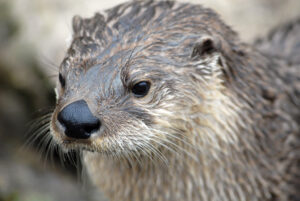Geographic Range and Habitat:
North American River Otters are found throughout most of North America including some of Canada and Alaska. They are semi-aquatic mammals, and thus are tied to bodies of either fresh or saltwater, but also require a high proportion of riparian habitat (the edges where water and dry land meet). Within Florida, North American River Otters are found throughout the state, with the exception of the Florida Keys. They have been spotted in all areas of the Florida Everglades, but may be better spotted in those areas with more riparian habitat, such as Big Cypress National Preserve.
Appearance:
North American River Otters are long-bodied mammals with short, dark brown hair and a lighter underbelly. They are well-adapted to their aquatic environment with short legs, webbed feet, and a thick, relatively long muscular tail used to propel them through the water with ease. Adults weight around 10-33 pounds and are about 2.5 to 5 feet long, and males are typically much larger than females.
Diet:
North American River Otters are carnivorous and predominately consume aquatic organisms such as crayfish, amphibians, fish, turtles, insects, and occasionally small mammals. They have great dexterity their front paws and often use them to hold their prey while eating.
Behavior:
North American River Otters are highly social and may be observed in groups, however it is not unusual to observe individuals living alone or in pairs. They often play and socialize when in groups using a range of different vocalizations. They also often spend much of their time marking territory using scent glands near the tail. North American River Otters are thought to be mostly nocturnal or crepuscular.
Reproduction:
North American River Otters typically reach sexual maturity at around 2-3 years old. The breeding season varies within their large geographic range, but breeding typically takes place in late summer or early winter. North American River Otters exhibit delayed implantation anywhere from 9-11 months, after which gestation is about 60 days. Birth usually occurs the following spring in a den constructed by the mother. During this time, mother provides the majority of parental care for the 1-3 pups until they are weaned and have left the den. The mother, father and pups will often live a family unit for another 7-8 months, often ended by the birth of a new litter.
Active research:
Recent:
- (2021) First Record of a North American River Otter Using a Cave as a Natal Den: https://bioone.org/journals/southeastern-naturalist/volume-20/issue-2/058.020.0215/First-Record-of-a-North-American-River-Otter-Using-a/10.1656/058.020.0215.short
Ongoing:
- There is no current ongoing research for North American River Otters in Florida. They are actually a rather understudied species in most of their range. However they are often spotted on game cameras in numerous projects throughout the Everglades.
Did you know?
- North American River Otters can swim as fast as 8 miles per hour and can dive up to 36 feet!
- Relatively little is known about the North American River Otter. Some research indicates they are monogamous, however other research indicates a polygamous social structure.
- The vocalizations of North American River Otters range from whistles, chirps, and growls.
Informational Links
Florida Fish and Wildlife Conservation Commission:
SeaWorld:
Smithsonian’s National Zoo and Conservation Biology Institute:
Taxonomy
- Kingdom– Animalia
- Phylum – Chordata
- Class – Mammalia
- Order– Carnivora
- Family – Mustelidae
- Genus – Lontra
- Species – Lontra canadensis
Species Status:
- Native
Listing Status
- Federal Status –Not Listed
- FL Status – Not Listed
- Native


